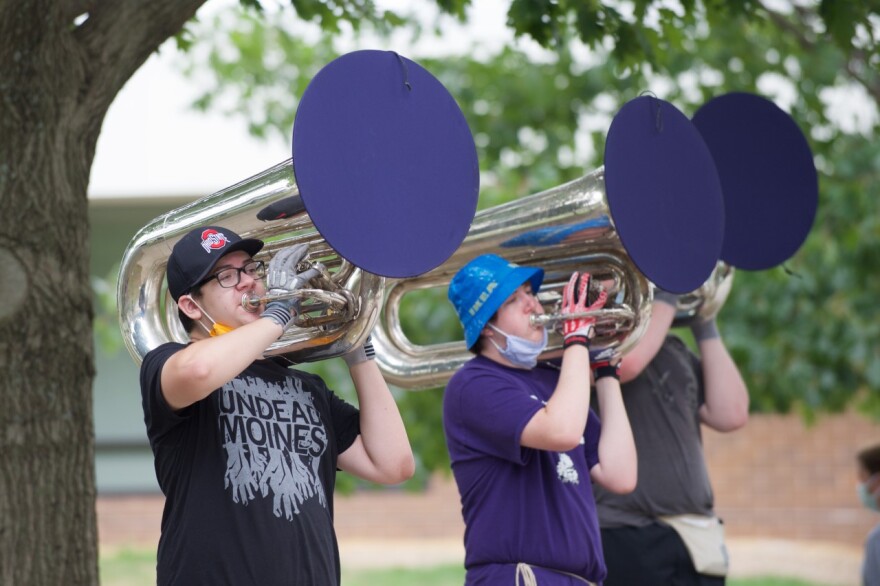School definitely looks different than it did last fall. Core classes are not the only ones affected. Extracurriculars look different too, and some pose more risks than others.
Studies show coronavirus spreads through aerosols, which are microscopic virus-packed particles that can remain suspended in the air. That means those participating in school band are facing their own unique set of challenges as they plan for the year.
Adam Hanten is a junior and trumpet-player in the Dowling Catholic High School marching band. He will be attending hybrid classes although Dowling does offer all-virtual classes, but he says even this plan is all up in the air. Since Hanten has been in band for a while, this year will still be familiar to him even with a few new safety guidelines.
“For our band, we’re keeping a four step interval at all times (that is) mandatory. So that’s seven and a half feet of distance between us,” Hanten said. “It’s going to be weird.”
High schools aren't alone in making plans to keep students separated. Jeffrey Funderburk, the director for the School of Music at the University of Northern Iowa, is taking his band's precautions even further and is placing students between physical barriers.

Funderburk says UNI's use of dividers is controversial since the Performing Arts Aerosol Study published guidance that dividers were not recommended. Funderburk added that UNI students are taking several other precautions as well.
At UNI, designated paths lead students into and out of the rehearsal space. Masks are required at all times that students are not playing (even during musical rests), and they have tested the HVAC system so they know air is being pulled from the space quickly without crossing other instrumentalists. He says its important for bands to find the solutions that work best for them.
"It is important to determine the strategies that are most appropriate for your specific situation," Funderburk said. "We've been at it for one week now and the students have been great."
The High School Band Director’s National Association (HSBDNA) released a guide in May to help band directors as they plan to return to their classrooms. The guide, available to the public online, includes best practices in a series of different models divided by size of class. In the HSBDNA Blueprint for Bands, it is recommended to “develop a band policy regarding the wearing of masks in all rehearsal and performance situations.”
According to the Performing Arts Aerosol Study done by the University of Colorado in Boulder, playing brass instruments with masks and bell covers is the safest way to prevent spread of the virus in a group setting. For woodwind players, the study offers the idea of "bagging" instruments to cover the bells and the key holes on the instrument. It also recommends social distancing guidelines that include arranging band rooms in straight lines rather than curved around the director and practicing outside when possible.
So, how are students are going to play music while wearing a mask when they have to have their mouth on a mouthpiece?
There are a few different options. Videos of horn players utilizing specialty masks with flaps that can be pushed up by instrument mouthpieces are circulating the internet.
There are also patterns for overlapping fabric to create a small slit that allows the mouthpiece behind the mask like this one. This is the design Johnston High School students will be using.
While this may seem doable for older students who are committed to making music regardless of the new parameters, it doesn’t make sense for everyone.
What about younger students?
Ryan McNulty is a fifth grade band teacher at nine different schools across the Des Moines Public School District. He says these new guidelines were part of the reason they decided to hold band lessons virtually this year, even before DMPS decided it was going to host its classes online as well.
“Originally we were going to be on a hybrid schedule, where kids were going to be in school half of the week and spend the other half at home. We were going to have band lessons when they would be home anyway,” McNulty said.
McNulty says he also worries that the safety precautions recommended for in-person instruction would be overwhelming for students just beginning to learn new instruments and discourage them from continuing with band.

“I’ll do absolutely everything I can to make the experience the best that it can be for my students, because you know fifth grade is the first of eight years playing in school band for a lot of the kids. I don’t want to jeopardize that for them,” he said.
The band teachers in the DMPS school district plan on doing this by keeping things as close to normal as possible, including getting instruments to students who cannot afford them otherwise. McNulty says about 60 percent of students use instruments the schools provide for them rather than buying or renting one on their own.
Will there be concerts?
Although students will be working just as hard to learn new music this semester, they will not have the same opportunity to perform it. Both Hanten and McNulty reported that their regularly scheduled concerts had been cancelled at least for the first semester, and they are still waiting on information about the spring.
Since the HSBDNA guide emphasizes practicing outdoors as a safer option, Hanten says his marching band is still slated to perform at football games, if they still happen. Despite the uncertainty surrounding returning to school, McNulty remains optimistic.
“The way I’ve tried to look at this the whole summer and spring is just that everything is 100 percent out of my hands,” McNulty says, “I can only make decisions based on what I’m given.”





